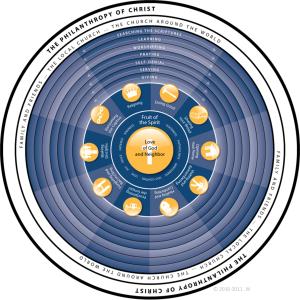 Post by Pastor Tim – New Year’s Resolutions are taking a beating from both the secular and the religious realms alike. In fact, it’s almost “in-vogue” to be against resolutions.
Post by Pastor Tim – New Year’s Resolutions are taking a beating from both the secular and the religious realms alike. In fact, it’s almost “in-vogue” to be against resolutions.
A friend on Facebook wrote how she is purposing to eat healthier this year, but that she isn’t going to make a resolution as those are set-up for failure. And a number of news articles have come across my laptop with exactly the same theme.
One famous Christian preacher called resolutions “dreadful”, while another common theme among the evangelical community focused on the thought that God doesn’t want us to plan, because ultimately the Lord directs our steps (Proverbs 20:24, Jeremiah 10:23, James 4:13-15).
From a Christian standpoint though, resolutions are simply recognition of the fact that there are sinful things in our lives that need changing. For example, if we don’t properly take care of our bodies, then we should resolve to eat better foods and exercise more. If we don’t properly take care of our finances, then we should resolve to spend less and save more.
So, the simple answer to the question asked in the title is, yes. Of course New Year’s resolutions are Biblical. You don’t have to look any further than Ephesians 4:22-24, where Paul tells the Ephesians to put off their old self and put on their new self, which was created to be like God in true righteousness and holiness!
To be sure, there is a difference between secular and sacred resolutions. In contrast to secular resolutions, sacred resolutions are ones in which we resolve to walk in the works that God has prepared for us from before the foundation of the world. But even with the sacred, we can try to do it in our own strength, make excuses or even over spiritualize the resolutions that we make. But let’s take the plain example of David in Psalm 119:59-60 when he said, “When I think on my ways, I turn my feet to your testimonies; I hasten and do not delay to keep your commandments.”
At DOTW Church, we practice the Month of Preparation which is similar to the practice of making resolutions. We draw heavily from our reflections of the previous month, while we plan for new growth in the coming year. We use the framework of the Works of Mercy, and how we are to reflect to others what Christ first did to us! We make sure our plans are directed by the Scripture, soaked in prayer, and we recognize the fact that God can certainly change our plans (James 4:15).
Making resolutions (plans) is not only Biblical, but it is needed if we desire to grow in Christ. God does work in the spontaneous moments, but he also works in the important practice of setting goals, plans and resolutions. I’ve even found that when God works in the spontaneity, it has often first been grounded through proper planning.
There is nothing sacred about the month of January for making resolutions or for planning, but there is also no excuse for not taking your growth in Christ seriously. Planning doesn’t show a lack of faith in God, but rather it shows an extraordinary trust that God can do what he promises to do in his word – sanctificy us (Romans 6)!











Pingback: 2014 Resolutions With Some Help From The Scriptures | Do the Word